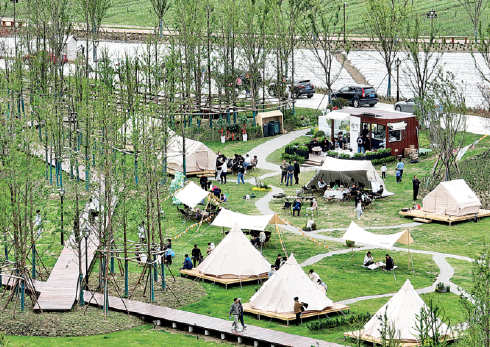Camping sector pitches up amid COVID scares
Increasing interest in exploring great outdoors during Labor Day holiday

Last year's Labor Day holiday was marked by plaid picnic blankets but this year's was overtaken by camping tents, an industry insider was cited as saying by news website xinhuanet.com.
A tourist surnamed Wang told Beijing Business Today that he and his family couldn't go on long-haul trips for this year's Labor Day holiday from April 30 to May 4 due to COVID-19 outbreaks in multiple parts of the country.
"So I took my family on a camping trip in a park outside the city. It was very relaxing and pleasant to get together with family and friends in a scenic place with mountains and rivers," Wang said.
Searches for "camping" hit a record high on online travel platform Ctrip on the first day of the Labor Day holiday, up 90 percent week-on-week. Bookings for camping trips placed on online travel platform Fliggy recorded a month-on-month surge of more than 350 percent during the five-day break, said a report by Beijing Business Today.
According to market research company iiMedia Research, the market size of China's camping sector jumped 78 percent year-on-year to 29.9 billion yuan ($4.45 billion) in 2021. The figure is estimated to hit 35.46 billion yuan this year, xinhuanet.com reported.
Wu Ruoshan, a researcher with the Tourism Research Centre of the Chinese Academy of Social Sciences, told Beijing Business Today that due to COVID-19 uncertainties and restrictions, in-depth, quality tours of local attractions became the mainstream during the Labor Day holiday. There was a notable trend of big city dwellers traveling to nearby suburbs and villages.
Another reason behind the camping craze is that widely used social media platforms such as Tik-Tok and Xiaohongshu have driven up the popularity of campsites, Shen Aixiang, founder and CEO of homestay management solutions provider Smart Order, told Hangzhou Daily.
Industrial boom
The camping boom has fueled the growth of related industries. Figures from corporate information provider Tianyancha show that the number of camping-related companies in China has grown rapidly over the past five years. More than 9,100 new ones registered in 2020 and over 20,000 registered in 2021.
Since Jan 1, more than 7,000 camping-related companies have been set up, xinhuanet.com reported.
Online travel agencies have launched campaigns and products to tap into the potential bonanza.
Ctrip released rankings of campsites based on indicators such as facilities, safety and the density of tents. Mafengwo hosted a livestream competition among campers that gave out awards based on the performance of their livestream sessions. Tuniu introduced short-haul camping trips such as a two-day camping getaway to the Huanghuacheng Lakeside Great Wall Reserve in Beijing's Huairou district, according to Beijing Business Today.
Environmental concern
But the camping boom also comes with problems such as environmental pollution, safety hazards and increased pressure on camping businesses.
Residents of Haiwozi town in Chengdu, Southwest China's Sichuan province, told xinhuanet.com that a mass of tents could be seen at a local campsite on every weekend or holiday.
As a result, there was always trash left behind. Some campers even poured wastewater into the river.
"The concept of 'traceless camping' has yet to be popularized,"Shen Wei, a seasoned outdoor enthusiast from Chengdu, was quoted as saying by xinhuanet.com. "This concept requires campers to make plans in advance, choose a campground that is strong enough for camping activities, properly dispose of trash and minimize their effect on the environment.
"They should reduce the environmental effect of outdoor fires, take away leftovers and try not to use soap," Shen added.
The potential dangers of camping should also be on people's radar. For instance, many campers like to cook food on an open fire, which could pose a fire hazard.
Healthy growth
Camping-related businesses are also facing their share of problems, such as fast-changing consumer demands and the rising cost of raw materials for making tents, according to The Economic Observer.
Wang Jigang, founder of The Free Spirits Tents, told The Economic Observer that they are experiencing a severe lack of production capacity and that demand is outstripping supply by a wide margin. The problems are compounded by overly conservative market demand forecasts.
Song Yu, an assistant researcher at the Institute of Sociology of the Chinese Academy of Social Sciences, told xinhuanet.com that camping meets people's leisure needs, but the next step should be to regulate the sector to ensure its healthy development.
He suggested that regulators take action on unqualified campsite operators and strengthen the supervision of behaviors such as those that are harmful to the environment.
Campsite operators should provide emergency equipment such as fire extinguishers and improve the management and maintenance of the grounds, Song said.

Today's Top News
- Country sees strong rebound in FDI
- Long March 10's booster retrieved from sea for 1st time
- China, US agree to strengthen dialogue, cooperation in various fields
- Fujian villages bear witness to changes
- Galas embracing tech prowess and rich cultures
- Global visitors experience authentic Chinese culture






























